- Home
- Alton Gansky
The Fog Page 2
The Fog Read online
Page 2
“You tell, ’em, girl,” Brenda said. She was the other one who spoke her mind to the professor. Andi had earned the right; Brenda just didn’t care what the professor thought.
“Krone & Associates has been in existence for thirty years and is responsible for scores of large building projects. About twenty years ago, the firm broke into the high-rise design business by winning a contest for a skyscraper to be built in Houston. They won a couple of contracts after that and pretty soon businesses wanting a high-rise with their name on it came calling. Now, bear in mind, much of this comes from their website, so it may be filled with PR fluff.”
“No doubt,” the professor said.
Brenda found a small bowl of cheese and another of tiny crackers. “Snacks!”
That woman can eat and never gain weight.
Andi pressed on, snacks not withstanding. “The president of the company is Allen Krone, as you might guess. His wife is Janice. Those are the first two photos. Both are sixty years old.”
“Ancient,” Daniel said. Then he smiled. I only mention that because he does it so seldom.
“Watch it, young man.” The professor straightened. “I happen to be sixty.”
“Ancient,” Daniel repeated.
Even the professor had to grin.
Andi cleared her throat. “If I may have everyone’s attention including young Daniel and Old Man McKinney.”
“Ohhh, nice one, girl,” Brenda said. “That moniker could stick.”
“It better not.” McKinney didn’t bother to look up from the page. It was if he was vacuuming the information into his brain. The man never seemed to forget anything or anyone. Kinda scary.
“Like many architecture firms, at least from what I can tell from the websites I visited, Krone & Associates has other partners.”
“Let me guess,” Brenda said. “Krone & Associates has, well, associates.”
“Nothing gets by you, Barnick,” the prof said dryly.
“Straight up, Doc.”
Andi sighed and plowed ahead. “The firm has two associates. I think they’re called ‘principals’ in the trade. The next photo on your page is Jonathan Waterridge. He’s forty and been with the firm for the last decade. I couldn’t find out what firm or firms he served once he left the University of Southern California School of Architecture. In fact, he’s barely a blip on the Internet.”
“The woman is his wife?” the professor asked.
“Yes. Her name is Helen. I imagine she’ll be at the party tonight. I couldn’t find out much about her, either.”
The limo slowed on the freeway. The professor’s source about San Diego traffic was right. We were surrounded by sedans, sports cars, a Humvee, and an eighteen-wheeler. Drivers and passengers stared at us. Now I know why limos have tinted windows.
“The third partner is Ebony Watt, age forty-five.”
“A woman architect?” I said. A chill filled the limo. The professor stared. Andi and Brenda glared at me. “Don’t get me wrong. I think that’s great.” The temperature dropped another five degrees. I sighed.
“She’s black, too, Cowboy,” Brenda said. “You wanna comment on that while you’re at it?”
At least she called me Cowboy. That was her favorite term for me. I’ve heard her use stronger, less complimentary terms for people.
“I didn’t mean that as it sounded. I just meant . . . How do I get out of this?”
“Tank, this is one of those times when silence is golden.”
“Understood, Professor. I’m shutting up now.”
“Ebony Watt came to the company from an architecture firm in Los Angeles. She graduated from UCLA with a degree in architecture and urban design. She also has a degree in interior design. I found out more about her than I did for Waterridge. She’s been featured in Architectural Record and other industry magazines. Oh, and I found this interesting: her husband is Eddy Bruce Watt.”
The last statement floated on a sea of silence. I started to ask who Eddy Bruce Watt is, but kept my promise of silence.
“Really?” Andi said. “Seriously? None of you know Eddy Bruce Watt? The blues player. You’ve heard of B. B. King, right?”
We all admitted to knowing King.
“Okay, Eddy has been described as a younger B. B. King.”
“If you say so,” Brenda said. “I’ve never been a big blues fan.”
The traffic began to move faster, and Andi took that as an excuse to move on. “The retirement party is a pretty big deal among some San Diego executives and politicos. Who knows, maybe the mayor will show up.”
“What’s her name?” I said. Another silence. “You see what I did there? Did ya?” I plastered on my biggest smile.
“Nice, Cowboy,” Brenda said. “There may be hope for you yet.”
“It feels good knowing that my friends would consent to be seen in public with me.”
“Hang on, Cowboy. I didn’t say that.”
“To answer your question, Tank,” Andi said, “I didn’t look up the mayor’s name. I’ll do that if he or she shows up.”
Andi began collecting the papers she had passed out a short time ago. “It wouldn’t be good to take these in with us. It might look like we’re a team of stalkers. Okay, last thing from me. This is more than a retirement party. Allen Krone is passing the torch to his partners. He will formally announce the new name of the firm: Krone, Waterridge, and Watt. As founder, his name stays on the letterhead, but the real business will be handled by others.”
I made a mental note. Now, if only I could remember who was who and when to keep my mouth shut.
Downtown San Diego oozed with cars and pedestrians. Some of the streets were one-way. Taxis slithered through lines of traffic. Pedestrians crossed at intersections, some even waiting their turn, others, not so much. It seemed every corner had a nightclub, bar, restaurant, fast-food joint, or some combination of those. Friday night was a busy time in the big city.
I watched the people on the street. There were men and women wearing nice clothes—not tuxes and evening gowns, mind you. They seemed too bright for that. Others wore their best barhopping rags. Many women wore skirts. Some were tiny. Others were tight. Some were both.
Mixed in the group were a number of people with dirty, tattered clothing, uncombed and filthy hair, and carrying bags of what I assumed were all their worldly possessions. They moved through the streets paying no attention to the partiers; the partiers returned the favor. It was if two worlds shared the same space and the people of one could not talk to the people of the other. There was sadness in seeing that. Didn’t seem right to stare at the homeless from inside a limo.
The driver showed great skill driving through the obstacle course of cars and pedestrians. He turned each corner as if he were steering a Volkswagen instead of a limo the size of an oceangoing barge. I hoped the professor would give the guy a big tip.
A Plexiglas window separated the driver’s area from the passenger compartment. I was beginning to wonder how we would know when we were getting near when a voice came over speakers hidden in the limo’s ceiling.
“We’re pulling up to the building now,” the driver said. “Someone will get the door for you.”
I was stunned. It was a woman’s voice. I had assumed the driver was male. You can bet I kept that little assumption to myself. Of course the driver had opened the door for us at the hotel, but I paid him, I mean her, no mind. I was blinded by the limo. Pretty dumb, I know.
“Thank you, driver,” the professor said. I had to admit, he was smooth. He acted like he was used to being carted around in a limo.
The vehicle slowed to a stop, but was still several feet from the curb. I guess one didn’t parallel park a car like this. As soon as the wheels stopped rolling, the door opened.
A man in a doorman’s uniform said, “Welcome to the Portal Bayfront Plaza. I hope you had a pleasant drive.” He held the door while he stood to the side. That was the first thing I noticed. The second thing was the man’s blue ski
n.
Yeah, that set me back a little, then I noticed the street and the sidewalk were also blue. When we exited the limo I learned why: our destination was a high-rise with a glass skin. All the glass was cobalt blue.
“Wow,” Brenda said. She tilted her head back. “I’m impressed. How tall is this thing?” Brenda had no problem striking up conversations with strangers.
The doorman closed the door, and the limo slowly pulled away. “Technically, ma’am, it is a fifty-story structure.”
“Technically?” Andi always wants details.
“Yes, ma’am. It is forty-eight stories above grade and two stories below. FAA regulations.”
As he said “FAA” a commercial airliner flew overhead. The doorman smiled as if he had planned that. “San Diego International Airport isn’t far from here. The Federal Aviation Administration limits all buildings in the flight path to five hundred feet or less.”
“But fifty-stories sounds better than forty-eight. Is that it?” Brenda said.
“I couldn’t say, ma’am.” He nodded and offered a Hollywood smile. “This way, please.”
He led. We followed. “You look good in blue, Tank,” Andi said. “Hey Brenda, can you use your magic tattoo ink to turn Tank blue?”
“I’d be willing to experiment.”
Apparently I wasn’t out of the doghouse yet.
I glanced at the building. I was too close to see all the detail, but what I could see was amazing. The front of the building was glowing blue glass, but partway up was a different floor. A single story was dark green. It split the building with maybe one-third of the floors below the glowing green band and two-thirds above. At least the best I could tell.
The doorman opened the front door to the lobby. I say front door, but it was more than one door. There were several doors set in a wall of glass. Pretty sleek. I said he opened the door to the lobby, but he didn’t really. He opened the door to a massive foyer. The building was tall with straight lines like giant refrigerator box set on end, but there was more to it than that. The big part of the building was set back from the street with the entrance—an extension that was as curvy as the rest of the building was straight—protruding to nearly the edge of the sidewalk.
We walked into the wide glass foyer. I caught sight of the professor slipping some folding money to the doorman, who took it without hesitation.
The ceiling of the foyer was curved, as were its walls. It was like walking into a bubble. Pretty neat. As soon as the door closed behind us, the outside sounds disappeared, replaced by the soothing bubbling of a fountain directly ahead. A single spiraling shaft rose from the wide fountain eight feet or so in the air and spurted out a gentle flow of water that fell into the fountain’s pool. The water was blue—I should say, it appeared blue. More lighting tricks. The spiral spout was jade green.
A set of wide steps waited in front of us. There were only three risers.
“Interesting,” Andi said.
Of course, I had to ask. “What?”
“Look at the tiles on the floor. Maybe they’re called pavers, whatever. There are fifty tiles across the lobby. They’re all blue marble—probably fake marble—except for the green ones that form a line.” She studied the floor for a few moments. We didn’t bother her. This is what Andi does. She sees patterns in almost everything. Seeing patterns in the floor tile would surprise no one who knew her.
“Each tile is about a foot square. That means the foyer is fifty-feet wide. Fifty. Like the number of stories in the building. And the green tiles start in the thirteenth row and run up the steps—”
“Like the green band on the outside of the building,” I said.
“Listen to you, Cowboy, going all Andi on us.” Brenda seemed impressed.
I shrugged. “It’s hard to miss.”
“I saw that, too.” Andi nodded. “I think the band would be the thirteenth floor. They carried the theme into the building.”
“It’s just consistency in design.” The professor could be dismissive. “It’s part of the theme.”
“If you say so.” Andi seemed a little miffed. “I’m just bringing it up.”
We walked up the three rows of steps, past the fountain, and into a much wider and taller space. The real lobby. People wandered about, many of the men in the same kind of tuxedo straightjacket I was wearing.
“This place is amazing,” I said. I was looking at the ceiling. Somehow, long glowing strips of light ran the width of the ceiling. This light was white and was the only illumination I saw. Curved blue couches were tucked here and there. The backs of the sofas were low and streamlined. The dark blue tile transitioned into rows of lighter blue until all the blue was gone and a few rows of white were left. Those ran in front of a wide desk like those in a fancy hotel. Several men and women stood behind the counter-high desk talking to guests. Behind the counter area were two tall structures that looked suspiciously like the building we were in. They even had the green stripe.
“You know, I once thought about being an architect.” The professor seemed to be sucking in the sights. “I studied it for a bit, but then got derailed by seminary.” He shook his head. “I should have stayed the course. I would have been of more use to society as an architect than I was as a priest.”
When we first became a team—at the time we didn’t know we were a team—I would have argued with him. Never did any good. Besides, this wasn’t the place to start a conversation that would put him in a bad mood. He had been almost fun to be around this evening. Not something I could say most times.
“But if you did that, Professor, then you would have missed out on meeting me.”
The professor glanced at Brenda. “I think you have that backward, Barnick. You would have had to miss me.” He paused. “Either way, we both might have been better off.”
And there it was. Dr. James McKinney had—just like old milk—turned sour. Brenda didn’t respond, and for that I will forever be thankful.
Something else caught my eye. Spaced around the large lobby were glowing blue trees. Not real trees because trees don’t usually glow. These were like sculptures—art. Each tree stood about five feet tall, had no leaves, and looked as if they were made of glass. As cool as the whole lobby was, those tree things were the coolest. If I were a thief, I’d have spent a little time trying to figure out how to sneak one of those babies out the front door. It would make a great night-light for Daniel.
Daniel was looking at them, too.
“Pretty great, right, little dude?”
He didn’t answer. Nothing new there. He did, however, look puzzled. Not afraid. Just confused. He’s a smart kid, so I knew I didn’t need to tell him they weren’t real trees. Maybe he was trying to figure out how they worked. I would have told him. If I knew how they worked.
We followed the professor to the long curved desk where three people in dark suits stood.
“Dr. James McKinney and party.” The professor had chosen one of the women to speak to. She had very blue eyes. So blue I suspected they were contact lenses. He reached into an inside pocket of his tuxedo coat and removed five invitations. They looked like tickets to a movie or something.
She smiled, took the invitations, and scanned them with one of those laser scanners you see in some stores. This scanner looked a little more high-tech. “Thank you, Dr. McKinney.” She handed one invitation back to him.
“Ms. Barnick?” the receptionist said.
“Yo.”
The professor cringed.
The blue-eyed woman handed an invitation to Brenda. “Please keep these with you at all times. They are part of the security system.” She handed back the rest of the invitations. She hesitated when she saw Daniel, but only for a moment. I guess she wasn’t expecting four adults to walk in with a kid.
Speaking of security—at each end of the check-in counter stood a man in a gray suit coat. Both were about my size, and each wore a security badge. The one on the right nodded at me. It was what one jock did when meeting
another.
We were directed to the elevators at the back of the lobby and told to use the one on the right. It was one of six elevators.
As we approached the elevator, I asked why we had to take the one on the right.
“Most likely,” the professor said, “the others don’t open on the top floor.”
Made sense to me.
Before we could press the Up button on the panel next to the elevator, the doors opened for us.
Andi stopped in her tracks. “It’s like it sensed our presence.”
“I think it did.” The professor continued into the elevator cab. “I bet our invitations have RFID chips.”
Brenda and I gave the professor a puzzled look.
“You wanna explain that, McKinney?”
I’m glad Brenda asked. Sometimes I get tired of being the one who doesn’t know anything, although I know more than most people think.
“RFID. Radio Frequency Identification. It’s used for many things, including security badges. The elevator knows we are near and that we have the right invitations.”
“Of course,” Brenda said. “So they can track us.”
“That’s a little paranoid, Barnick.” The professor paused as we stepped into the elevator cab. “But yes, they can.”
CHAPTER
3
Top Floor Party
The elevator was completely red inside. Like the building, like the fake trees in the lobby, the walls glowed. Since coming here I had been blue and now red.
“Odd,” Andi said.
“Uh-oh, here it comes.” Brenda and Andi got along pretty good, but no one was protected from Brenda’s quips. “Whatcha got, Pattern Girl?”
“Again with the Pattern Girl, Brenda? Really?”
“Sorry.”
She didn’t sound sorry to me. “What is it, Andi?”
Andi pointed at the control panel. “There’s no floor thirteen. Either someone can’t count or they’re a tad on the superstitious side.”

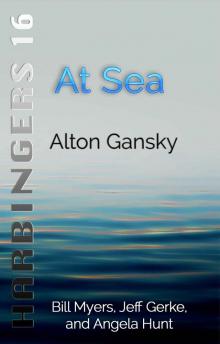 At Sea (Harbingers Book 16)
At Sea (Harbingers Book 16)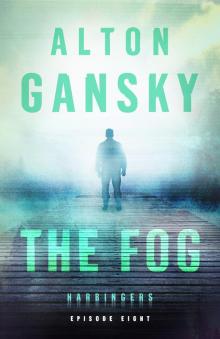 The Fog
The Fog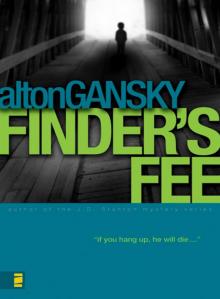 Finder's Fee
Finder's Fee Wounds
Wounds End Game (Harbingers Book 20)
End Game (Harbingers Book 20)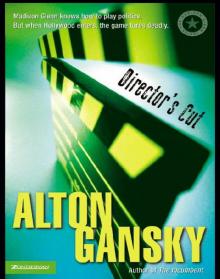 Director's Cut
Director's Cut Zero-G
Zero-G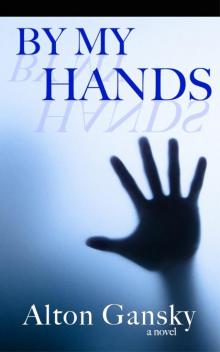 By My Hands
By My Hands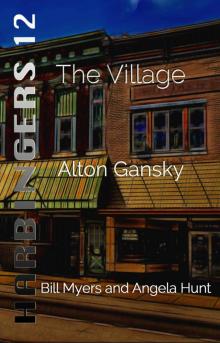 The Village (Harbingers Book 12)
The Village (Harbingers Book 12) Beneath the Ice
Beneath the Ice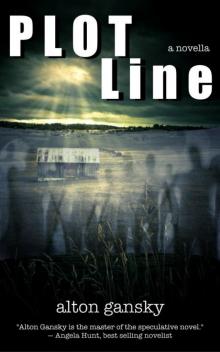 Plot Line
Plot Line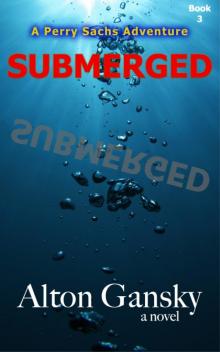 Submerged
Submerged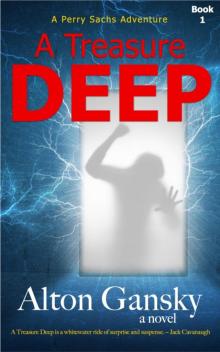 A Treasure Deep
A Treasure Deep